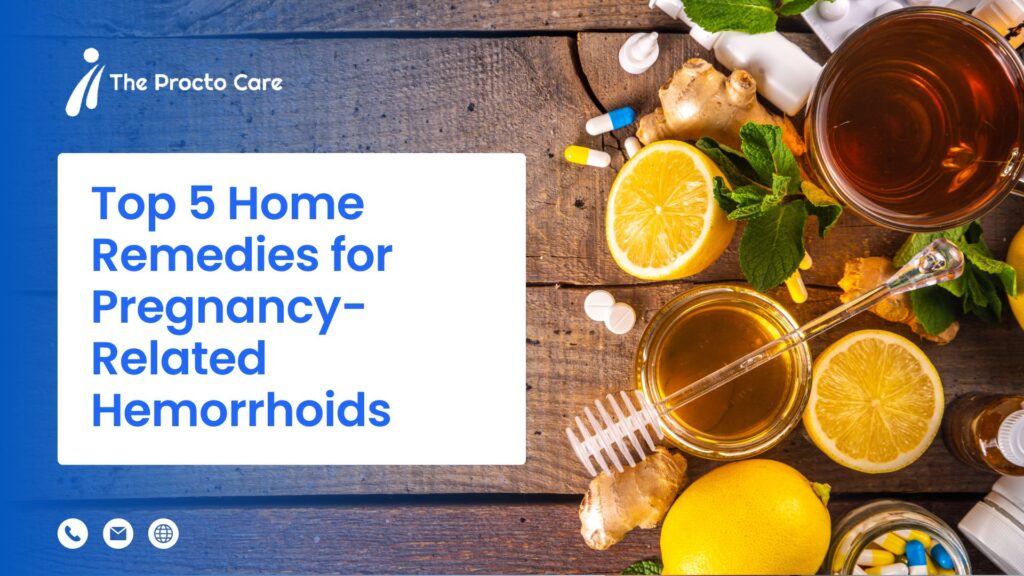Many women experience hemorrhoids during pregnancy. They’re uncomfortable, sometimes painful, and often difficult to talk about. But they’re also very common. Studies show that up to 85% of pregnant women may develop hemorrhoids during their third trimester. This happens due to increased pressure in the pelvic area, hormonal changes, and constipation.
As a proctologist, I often recommend home remedies as the first line of treatment—especially during pregnancy when medications should be used with caution. If you’re pregnant and dealing with hemorrhoids, this guide will help you manage symptoms safely at home.
Why Do Hemorrhoids Happen During Pregnancy?
Hemorrhoids are swollen veins in the rectum or anal area. During pregnancy, the growing uterus presses on the veins in the lower body. This slows down blood flow and increases the chances of vein swelling. Constipation, which is common during pregnancy, makes it worse.
There are two types of hemorrhoids:
- Internal: inside the rectum
- External: under the skin near the anus
You might notice pain, itching, swelling, or even bleeding after a bowel movement. While the symptoms may feel alarming, they usually improve with the right care.
Why I Recommend Home Remedies First
Most pregnancy-related hemorrhoids don’t require surgery or strong medicines. Home remedies are usually enough to control the symptoms. They’re safe, easy to follow, and often prevent the problem from getting worse.
Let’s look at five remedies I frequently suggest.
1. Warm Sitz Baths
- Soaking in warm water provides fast relief. I recommend sitting in 2–3 inches of warm water for 10–15 minutes, twice or thrice daily. It reduces pain, swelling, and irritation.
- You can also add a spoonful of Epsom salt or a pinch of alum (phitkari) to the water. Both have mild anti-inflammatory properties and help in healing.
2. High-Fiber Diet, Fluids, and Gentle Movement
- Constipation worsens hemorrhoids. I always advise pregnant women to eat a high-fiber diet—about 25 to 30 grams a day. Include plenty of fruits, vegetables, whole grains, lentils, and leafy greens.
- Drink 8 to 10 glasses of water a day. It keeps your stools soft and easy to pass.
- Also, avoid sitting or lying down for long periods. A simple 15–20 minute walk every day helps your digestion and improves circulation.
3. Cold Compress
- Cold reduces inflammation. Wrap ice in a clean cloth and apply it to the affected area for 10–15 minutes. Repeat this a few times daily.
- This is especially useful if you have external hemorrhoids or swelling after a bowel movement. Don’t apply ice directly to the skin—always use a barrier like a cloth or towel.
4. Natural Topical Remedies
I often see relief in patients who use these natural soothers:
- Witch Hazel: It has astringent properties. Dab it gently using cotton pads. It reduces itching and pain.
- Aloe Vera Gel: Use pure aloe. It cools the area and reduces inflammation.
- Coconut Oil: A natural moisturizer that reduces irritation and may help reduce discomfort after passing stool.
Always do a patch test before trying any new product, even if it’s natural.
5. Gentle Herbal Measures
- In India, traditional remedies often work well when used carefully. A sitz bath with alum (phitkari) is one such remedy. It’s commonly used in Unani and Ayurvedic practices. The alum helps shrink swollen veins and provides relief.
- Some women also use neem paste or turmeric water in their sitz baths. These herbs have antibacterial properties. While these are not widely studied in pregnancy, they’re commonly used under guidance and often show positive results.
- Avoid invasive Ayurvedic procedures like kshara sutra during pregnancy. Stick to external or topical remedies.
Simple Habits That Help
Many websites skip the small things that make a big difference. Here’s what I advise:
- Don’t delay bowel movements. Go as soon as you feel the urge.
- Avoid straining. It makes the veins swell more.
- Use a small footstool to elevate your legs while sitting on the toilet. This improves your posture and reduces pressure.
- Keep the area clean. Wash with plain water after using the toilet. Avoid soaps, perfumed wipes, or harsh toilet paper.
When to See a Doctor
If your symptoms don’t improve after two weeks of regular home care, or if you have heavy bleeding, severe pain, or a lump that doesn’t go away, consult a specialist.
In some cases, you may need a prescription cream or further treatment—but only after delivery unless absolutely necessary.
Final Words
Pregnancy-related hemorrhoids are common, but they don’t have to disrupt your life. With simple changes and safe home remedies, most women find relief within a few days to weeks.
Start with warm baths, eat more fiber, stay active, and use gentle topical relief. These steps work well when practiced daily.
And remember, you’re not alone—many women go through this and recover completely with time and care.
FAQ – Pregnancy-Related Hemorrhoids
1. Are hemorrhoids during pregnancy dangerous for me or my baby?
- No. Hemorrhoids are common—mostly in the third trimester—and do not affect your baby. They cause discomfort but are rarely dangerous. I reassure my patients that they typically improve after delivery.
2. Can I treat hemorrhoids at home while pregnant?
- Yes. Warm sitz baths, high-fiber diet, ice packs, gentle exercise, and topical natural remedies often work well. They relieve symptoms safely without medication.
3. How can I prevent constipation to avoid hemorrhoids?
- I advise eating at least 25–30 g of fiber daily (fruits, whole grains, lentils), drinking 8–10 glasses of water, and gentle walks or Kegel exercises.
4. When should I see a doctor for hemorrhoids?
- Seek medical help if you have heavy bleeding, severe pain, symptoms lasting over two weeks, or fainting/lightheadedness.
5. Will hemorrhoids go away after delivery?
- Yes. Most hemorrhoids resolve within weeks after childbirth as hormonal effects and vein pressure ease.

